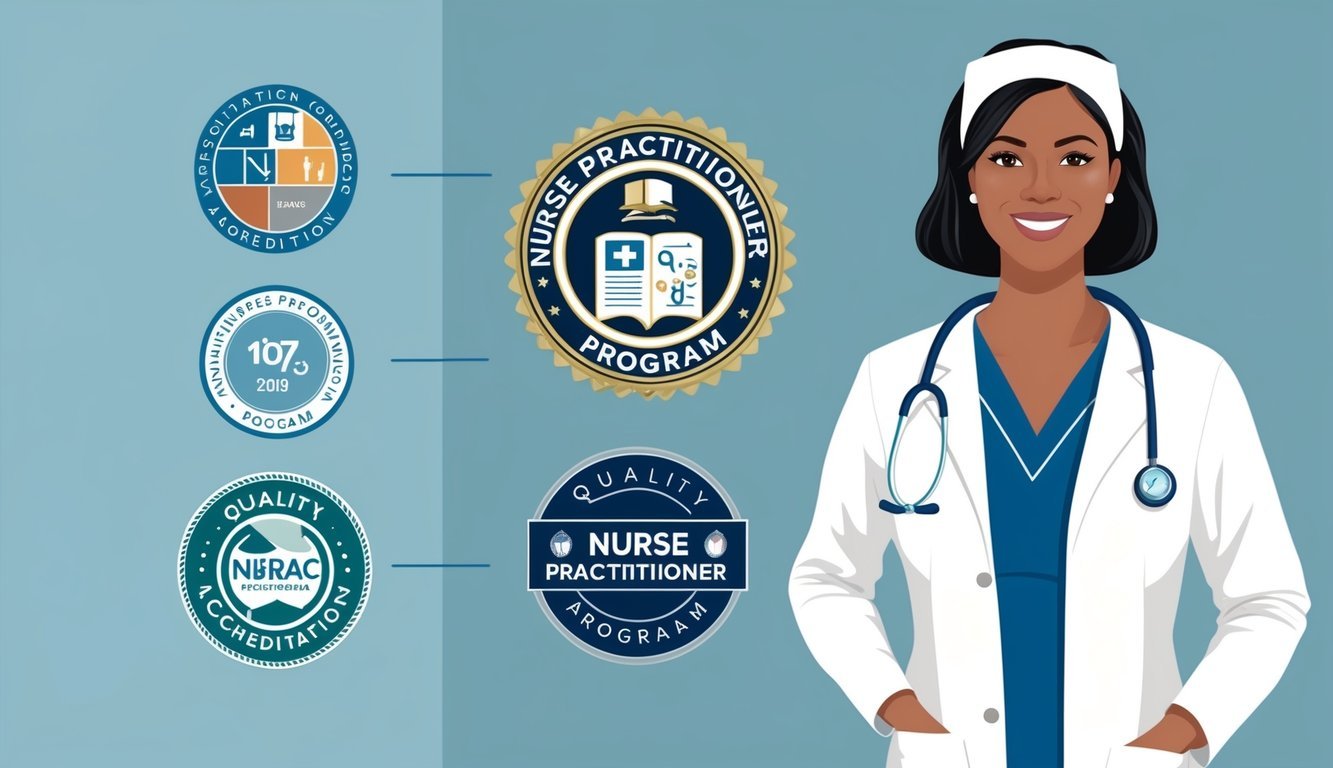As you embark on your journey to becoming a nurse practitioner, you need to know which programs can offer you the easiest pathway to success.
The world of advanced practice nursing is diverse, with various specialties you can choose from. For those looking for accessibility and a supportive learning environment, psychiatric mental health nurse practitioner (PMHNP) programs stand out as the easiest options for entry.
Finding a program that aligns with your goals while maintaining manageable admission standards can significantly impact your career trajectory.
Many institutions now offer online courses and flexible schedules designed to cater to busy professionals.
Institutions like the University of Southern Indiana provide accessible programs that equip you with essential skills and knowledge in a streamlined format.
In addition to evaluating program prerequisites and formats, exploring factors such as tuition costs and student support services is essential.
This approach will help you identify a path that not only fosters your growth but also aligns with your financial considerations.
By focusing on these elements, you enhance your chances of a smooth transition into the nurse practitioner field.
Exploring Nurse Practitioner Programs
Nurse practitioner programs offer various specialties and educational pathways tailored to your career ambitions.
Understanding these options can help you select a program that best fits your goals in the nursing field.
Understanding the Different NP Specialties
Nurse practitioner concentrations allow you to specialize in areas of healthcare that align with your interests.
Common specialties include:
- Family Nurse Practitioner (FNP): Focuses on providing comprehensive care to patients of all ages.
- Pediatric Nurse Practitioner (PNP): Centers on child health and development, addressing specific needs in pediatric populations.
- Psychiatric Nurse Practitioner (PMHNP): Emphasizes mental health, providing psychiatric care and therapy.
- Neonatal Nurse Practitioner (NNP): Specializes in the care of newborns, especially those born prematurely or with health issues.
- Adult-Gerontology Nurse Practitioner (AGNP): Concentrates on care for adults and the elderly, addressing complex health issues.
Each specialty requires distinct skills and knowledge, making the choice of program critical.
Comparing Education Pathways and Degrees
When selecting a nurse practitioner program, consider the educational pathways available.
Most NP programs require a Bachelor of Science in Nursing (BSN) as a prerequisite.
You can choose between:
- Master of Science in Nursing (MSN): Typically a 2-3 year program that prepares you for advanced practice.
- Doctor of Nursing Practice (DNP): A doctoral program that emphasizes clinical practice, often taking 3-4 years to complete.
- BSN-to-DNP Program: Directly transitions from a BSN to a DNP, streamlining the education process.
- MSN-to-DNP Program: For those who already hold an MSN, this program leads to a doctorate focused on practice leadership.
Evaluating these pathways will help you align your educational goals with your desired nurse practitioner specialty.
Each option provides unique advantages depending on your career aspirations.
Admission Requirements and Acceptance Rates

Understanding admission requirements and acceptance rates is crucial for aspiring nurse practitioners.
These elements significantly impact your chances of entering a suitable program and advancing your career.
Admission Criteria for Prospective Students
To gain admission into a nurse practitioner program, you typically need to have a valid registered nurse (RN) license and a Bachelor of Science in Nursing (BSN).
Many programs also require nursing experience, which may vary from a few months to several years.
Here are some common admission criteria:
| Requirement | Details |
|---|---|
| RN License | Must have an active RN license. |
| Nursing Experience | Some schools prefer candidates with clinical experience. |
| GPA | Most programs require a minimum GPA, often around 3.0. |
| Recommendations | Letters from professional references or nursing supervisors are usually needed. |
| Personal Statement | A clear explanation of your goals and reasons for choosing the program is often required. |
Programs like those at Vanderbilt University and Georgetown University often emphasize strong academic records and relevant experience due to high competition.
Understanding School Acceptance Rates
Acceptance rates for nurse practitioner programs can vary widely.
Some programs are more accessible, while others maintain strict admission policies.
For example:
| University | Acceptance Rate |
|---|---|
| University of Texas at El Paso | ~45% |
| Vanderbilt University | ~20% |
| Old Dominion University | ~50% |
| Delta State University | ~60% |
Lower acceptance rates typically indicate a more competitive program.
It’s essential to research individual schools to find programs that match your qualifications.
Accreditation and Program Quality Indicators

Understanding the accreditation status and quality indicators of nurse practitioner programs is crucial for your success and career advancement.
These factors directly influence the level of education and preparedness you will receive in the field.
The Importance of Program Accreditation
Accreditation validates the quality and credibility of a nurse practitioner program.
It ensures that the program meets established educational standards set by recognized bodies such as the Commission on Collegiate Nursing Education (CCNE).
Attending an accredited program can impact your eligibility for financial aid and your ability to obtain licensure.
Accredited programs offer several benefits, such as:
- Quality Assurance: Accredited programs adhere to rigorous curriculum and practice standards.
- Recognition: Employers often prefer graduates from accredited institutions, which can enhance job prospects.
- NCLEX-RN Pass Rate: Accredited programs typically show higher pass rates for the NCLEX-RN, a critical exam for nursing licensure.
NP Program Success Metrics
Success metrics help gauge the effectiveness of a nurse practitioner program.
Important indicators include retention rates, clinical hours completed, and positioning in job markets.
Key Indicators:
- Retention Rate: High retention rates suggest student satisfaction and effective program support.
- Clinical Hours: A robust clinical component is vital. Programs are expected to provide comprehensive hands-on experience, often exceeding 500 hours.
- NCLEX-RN Pass Rate: Monitoring this pass rate provides insights into student preparedness. Many programs aim for a pass rate above 90%.
Online Nurse Practitioner Programs
Online nurse practitioner programs provide a flexible path allowing you to balance your education with your personal and professional commitments.
These programs use technology to deliver quality nursing education through distance learning, offering various specializations and degrees.
Advantages of Online NP Programs
Online NP programs offer significant flexibility.
You can often attend classes on your schedule, making it easier to manage work and family life.
This format is ideal for those who need to balance their studies with other responsibilities.
Accredited online nurse practitioner programs, like those from institutions such as Maryville University of Saint Louis and Simmons University, ensure you receive a quality education recognized by employers.
Additionally, many online MSN programs maintain high pass rates for national certification exams.
Cost savings are another advantage.
You can save on transportation, housing, and materials.
Overall, online learning is often more affordable than traditional programs, making it a prudent choice for many students.
Selecting the Best Online NP Program
When selecting the best online NP program, consider accreditation and flexibility.
Look for programs recognized by the CCNE or the ACEN to ensure quality education.
Evaluate the course offerings and specializations.
Some programs may focus on areas such as family practice or psychiatric care.
Programs from Samuel Merritt University offer diverse pathways for you to pursue your interests.
Examine the support services available.
Programs that provide dedicated advisors, tutoring, and career support can enhance your experience.
Research reviews and testimonials to gauge student satisfaction and outcomes.
Finally, consider the technology used in coursework.
Reliable platforms that facilitate communication and interaction are essential for a productive online learning environment.
Financial Considerations and Support

Pursuing a nurse practitioner program involves various financial considerations that can significantly impact your educational journey.
Understanding your financial aid options and calculating the total costs will empower you to make informed decisions.
Navigating Financial Aid Options
When considering a nurse practitioner degree, exploring financial aid is crucial.
Various options exist, including federal grants, scholarships, and loans.
-
Federal Aid: Complete the Free Application for Federal Student Aid (FAFSA) to determine your eligibility for federal financial aid.
-
Scholarships: Many institutions, such as Cedarville University and Cox College, offer scholarships specifically for nursing students. Research these opportunities early to maximize your chances.
-
State Programs: Be aware of state-sponsored grants or loan forgiveness programs that may apply to nurse practitioners.
Applying for aid as soon as possible can result in securing your funding well in advance of your program.
Calculating the Total Cost of an NP Program
Understanding the financial commitment involved in your nurse practitioner program is essential.
The costs can vary based on the institution and the format of the program (online or in-person).
Here’s a simplified cost breakdown:
| Cost Component | Estimated Amount |
|---|---|
| Tuition (per credit) | $400 – $700 |
| Books and Supplies | $500 – $1,200 |
| Fees (program, library) | $200 – $500 |
| Living Expenses | Varies |
It’s important to factor in all expenses, including living costs and supplies, when budgeting.
Some institutions offer payment plans to help manage costs, making financial planning more manageable.
Researching affordable options like Cox College’s NP program can also provide necessary insights into affordability and financial support.

